By Wayne Lincourt
Sturm, Ruger & Co.
The widely acclaimed Ruger LCR (Lightweight Compact Revolver) just got even better. As you know, the LCR is one of Ruger’s best-selling guns. They hit a home run when they introduced the first polymer revolver in January of 2009, and since then they’ve added several new versions to broaden the market for this revolutionary snub nose. The latest is the .38 spcl./.38spcl+P version with an external hammer—the LCRx. Don’t worry, the addition of the hammer hasn’t changed any of the great handling and shooting qualities of the double-action-only (DAO) LCR. It still has the same polymer lower housing that holds the fire control components, the same aluminum alloy upper and the same stainless steel barrel liner and cylinder. However, with this model you have the option of pulling the hammer back and firing in single-action (SA) mode.
One of the qualities the LCR is best known for is its smooth double-action trigger. The close tolerances of the polymer frame and the patented friction-reducing cam action of the trigger group ensure that each and every gun has the same great trigger. That was a meaningful breakthrough in a mass-produced firearm. Out of the box, the new LCRx measured an average of 10 pounds 10.5 ounces of force needed to pull the trigger through in double-action mode, but it feels lighter thanks to its inherent smoothness. There was no stacking and a clean, crisp break, just like its predecessors. The single-action trigger was crisp and clean, with no creep and minimal overtravel. At a trigger weight of 6 pounds, it’s an excellent SA trigger for a self defense gun.
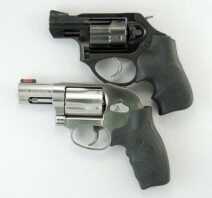
The LCRx is slightly smaller than this .357 magnum J-frame. It’s about the same size as the S&W 15 oz. Airweight in .38 +P. The difference in trigger guards is obvious in this photo.
Judging by gun sales, the snub nose .38 revolver in general is one of the most, if not the most, popular self-defense gun type going. There are several reasons for this. The gun is small, easily concealed, reliable and fires an acceptable defense round, made even better in the .38+P cartridge, a more powerful version of the venerable .38. In addition, it is very easy to deploy in an emergent situation—just draw, aim, and pull the trigger. No safeties to mess with. The original LCR had no external hammer, maintaining the easy-to-deploy philosophy while eschewing an external hammer which could become snagged on clothing. However, some individuals prefer to have the SA option. I am one of those, and I’ve carried a Smith & Wesson J-Frame snubby for years. Fortunately, I’ve never had to defend myself with it. I have, however, used it for target shooting, plinking, and carried it as a backup when hunting. In those instances, it’s nice to be able to fire single action which is generally more accurate due to the shorter, lighter trigger pull.
So how about the snagging problem? Getting hung up on the hammer spur is a valid concern for a self defense gun. The LCRx starts out with a short hammer spur that minimizes the chances of getting snagged on clothing. I guess if you wanted you could grind it down even further. I put the naked gun into various pockets and made numerous draws without the hint of a snag. That doesn’t mean that it can’t happen, but experience tells me that it’s not likely. Another way to reduce the chances of a snag is to use a holster, even when carrying in a pocket, which I like to do when wearing heavier cold weather clothing. Using a pocket holster holds the gun in the proper orientation for presentation, helps reduce wear on your clothing, and prevents your keys and other loose objects from getting into the trigger guard. It also provides a smooth, snag free draw. If the chance of the hammer spur snagging still bothers you, there’s a simple solution—just buy one of the DAO LCRs.
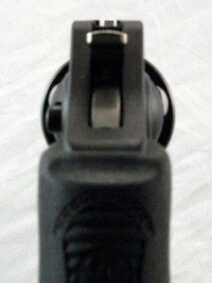
The sights are adequate but a switch to a more visible front sight would help in quickly developing situations.
The LCRx weighs 13.50 ounces empty. In your hand, even that minimal weight seems to disappear due to the excellent balance and ergonomics. It’s a nice size for concealed carry—1.282” at the cylinder, its widest point; 6.5” long; and 4.5” high to the top of the front sight blade.
The sight is typical for a snub nose revolver—a ramped front sight and a small U-shaped notch in back give you a sight picture adequate for most needs. My only criticism is that the sight picture is difficult to acquire quickly, especially against a dark background. Other snubbies share this problem. I addressed it on my J-Frame by swapping the factory sight for a light pipe. Fortunately, you can also change sights on the LCRx. The front sight is held in place with a small pin and some bedding material which can be easily removed. There are several types of sight available in the aftermarket. HiViz, for example, offers a selection of fiber optic sights in various colors. Meprolight and XS Systems seem to be the most popular Tritium dot front sights. XS systems in Fort Worth, Texas, introduced their “Express Sight” in 2006. It even has a Ruger part number (RP-0008N-4). In fact, other LCR models are available from Ruger with the XS sight and I wouldn’t be surprised to see Ruger offer the LCRx with it as well. This gives you a much more visible sight during the daytime with the added benefit of a highly visible night sight.
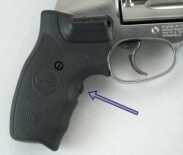
Crimson Trace makes a laser grip for the LCR similar to this one. Your second finger falls naturally over the “on” button so you don’t have to think about turning it on.
Another excellent option is a laser sight. I have a Crimson Trace laser grip on my J-Frame and highly recommend it. As you wrap your hand around the grip, your second finger naturally rests on the on button automatically turning on the sight. No remotely mounted buttons or switches to hunt for. It greatly improves your accuracy with the gun with the added benefit of providing an aid for dry firing to improve your proficiency. As in the XS Express Sight, the Crimson Trace laser grip is available on other LCRs and I would think it will eventually be available on the LCRx as well. You save money by buying the gun already equipped with your sight of choice versus buying the sight after the fact.
The light weight of the LCRx makes for a comfortable carry gun. You might think that the trade-off would be a harsh recoil, but that’s not the case. It does recoil more than my J-Frame, but it also weighs half as much. Still the recoil was not uncomfortable and it was easy to control the muzzle flip to get back on target quickly. The recoil for the +P loads was marginally greater than the lower powered .38 special rounds, almost unnoticeably so, especially firing the Hornady Critical Defense 110 grain .38 +P. The Hogue grip is responsible for absorbing a lot of the recoil. It has a softer insert where the grip fits into the web of your hand adding to the comfort level. The finger groves provide a secure grip and fit my relatively small hands well. The polymer frame has also been given credit for reducing felt recoil. I didn’t have a comparable all metal gun, like a Smith & Wesson Airweight, for a direct comparison, so can’t say for sure.
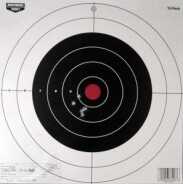
My best group firing double action from 21 feet was an inch and a quarter with Herters 158gr, .38 Spcl., FMJ. This gun is capable of shooting better than I can.
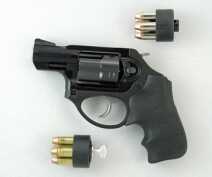
Two of the most popular five-shot speedloaders. The top one is from Safariland. The bottom is an HKS. The Safariland doesn’t work with the LCR.
Surprisingly, at least to me, my best group resulted from firing double action from a standing position. The five shots grouped into a center-to-center group of 1.241” at 21 feet, a testament to the smoothness of the DA action. My other targets produced similar results but generally with a flier that doubled the size of the group. I attribute that to the shooter, not the gun. It’s a very accurate gun for a 1.875” barrel.
There were some interesting numbers that came from the chronograph. Herter’s 158 grain full-metal-jacket (FMJ) rounds clocked an average of 741.48 feet per second for 193 foot-pounds of energy. The Hornady Critical Defense .38 spcl +P, 110 grain hollow points, on the other hand, chronographed at an average muzzle velocity of 965.16 fps or 227 foot-pounds of energy. Not too shabby for a pocket gun.
When selecting speedloaders, be careful because they won’t all work with the LCR/LCRx. The two most common brands of five-round speedloaders are Safariland and HKS.
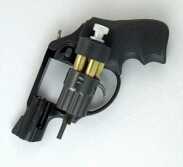
With the HKS speedloader, you just need to start the rounds into the cylinder. Then with a twist of the silver knob, the rounds drop free.
The Safariland is the easier to use because you simply press the rounds into the chambers until the rear of the cylinder depresses the release. Unfortunately, you can’t do this on the LCRs because the Hogue grips prevent the speedloader from lining up straight with the chambers. The front of the bullets enter the cylinder, but the grip prevents you from pushing the speedloader in far enough to work the release mechanism. The HKS speedloader, however, works fine. You don’t have the same problem related to lining up the rounds with the cylinder because the release is a knob on the back of the speedloader. Once the rounds are started in the chambers, just twist the knob about an eighth of a turn clockwise and the rounds drop the rest of the way home.
Holsters are readily available for the LCR and many S&W J-Frame holsters will fit as well, although not all. The trigger guard is slightly bigger on the LCR, so try a holster before you buy it unless it’s marked for the LCR.
All-in-all, the LCRx is another winner from the Ruger stable of guns. When you’re holding it, it feels like part of your hand, pointing naturally. It’s also comfortable to carry, has a very nice trigger, and is a lot of fun to shoot. MSRP is $529, the same as the other Ruger .38 +P LCRs. Ruger is currently shipping guns so if they’re not yet available at your local dealer, they will be soon.

The Safariland speedloader must be pushed in far enough that the back of the cylinder depresses the button in the middle to release the rounds. The Hogue grip prevents that.
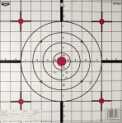
Herters 158gr .38 Spcl. FMJ, single action from 21 feet. Inch and a half group not counting the flier

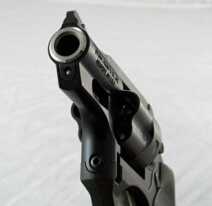
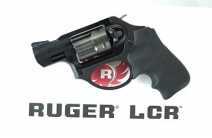
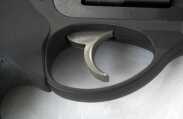
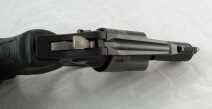
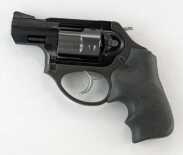

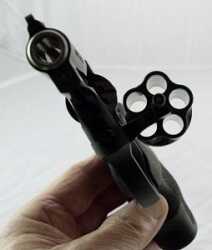

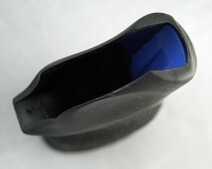
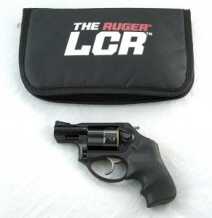

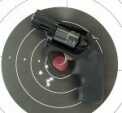
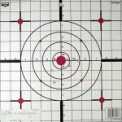
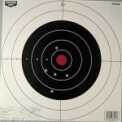
Great post. How do you feel about the price tag? Can\’t wait to read more content.
I’m a lifelong Sig fanatic & I’ve put together quite the collection of Sigs, as well as another couple dozen semi-autos from .45acp’s to .22lr’s. From FN Herstals to an H&R. From Sig Sauers to a Para Ordinance & everything in between! When I began searching for a backup, I knew that I wanted a revolver, as they are far & away the most reliable handgun manufactured when cared for & used properly! I did my homework & read every review I could find and began hitting the local dealers. I bought 12 revolvers by the time I was through, but I only bought 1 brand new, knowing that I’d whittle them down….somewhere between 2 to 4 keepers. I bought Colts, S&Ws, Rugers….along with an H&R .22lr I inherited from an uncle. I took each to the range & whittled them down to a total of 4.
I kept the LCRx .38spl+P 5 shot & liked it so much that I bought a brand new “twin”, with the difference being a tritium front post. I kept the S&W Performance Center model# 327, .357mag 8 shot Scandium & Titanium Snub Nose & the H&R .22lr 9 shot that I inherited! I OBVIOUSLY FELT THE RUGER LCRx WAS FAR & AWAY MY TOP PICK FOR THE JOB OF BACKUP REVOLVER!!!!
___________________________________________________________________________
NOTE: THERE ARE MORE SPEEDLOADERS AVAILABLE FOR THE LCRX THAN WERE MENTION ED IN THIS REVIEW!!!! I WENT WITH 2 SPEED BEEZ SPEEDLOADERS AND ALSO 2 RANGE BOXES THAT HOLD 50 ROUNDS EACH, IN WHICH YOU INSERT 10 RINGS OF 5 ROUNDS ALREADY SET UP FOR THE SPEEDLOADERS TO PICK UP AND LOAD IN ORDER TO SAVE A GREAT DEAL OF TIME WHEN YOU HIT THE RANGE!!!! THE SPEED BEEZ MAY BE A BUT MORE EXPENSIVE IN THE BEGINNING, YET THEY ARE LONGER THAN THE SAFARILAND MODEL & HAVE LONG ALUMINUM HANDLES WHICH ALLOW FOR THE GRIPS & USE THE SAME PUSH IN TO RELEASE “ACTION”, BUT WITH A LONGER, TAPERED HANDLE…THE GRIPS AREN’T A HINDERANCE WHATSOEVER!!!!
i was all set to buy the ruger LCR but it appears it is no longer available in 9 mm. what happened ?
Excellent review. I have a LCRX and it is great. Previously owned the LCR. I sold it to a friend and he loves it. Thanks for an honest up front review that is not biased.
The gun itself strikes me as just another solution in search of a problem, and the further suggestions as to sights, barrel lengths, and so on make no sense. Remember when (was it by Charter Arms?) a revolver was introduced to use rimless semi-auto pistol rounds? The intent was to provide a backup for people using semi-auto pistols, so that they could strip off rounds from their magazines into the revolver cylinder. Immediately, folks started asking about speedloaders. Why was this an issue? If you wanted or needed an backup that you could feed with a speedloader, there were plenty of them already available. It seems to me that the LCR was designed to be a lightweight CCW gun – for quick-draw, close-quarters use. Why do you need a hammer spur for what is essentially a “belly-gun”?
I suspect the best speedloaders for this revolver are the ones made by 5 Star in the USA.. They are about double the price of the HKS speedloaders, but are very high quality. They are cnc machined and slightly smaller around the outside so they fit easier past the Hogue grip. The 5 Star twist to release knob releases the cartridges when turned counter clockwise rather than clockwise (like HKS) so it also makes it easier to release due to the revolver cylinder swinging out to the left. Just takes getting used to, but it really makes sense.
Hey RUGER!
Hire me in your design dept.
I could easily design a hammer that doesn’t stick out, but is easily manipulated.
The biggest improvement Ruger could make would be to chamber the LCR in .327
Ruger DOES offer the LCR in .327. Also, the LCRx, the SP 101, and the GP 100.
What would REALLY be nice for this and LCR is an add-on adapter to the stock enabling 3 finger grip vs. only 2. Anyone seen or heard anything along this line
Iused to carry a .22 S&W Kit gun. that was built on the .32 frame. It was a great little weopen to carry almost anywhere. The Ruger could well offer the LCR in the 4″ barrel in a .357. Now, I would be interested into looking at that one with a hammer. Great for conceal carry as well.
I’ll be interested when they come out with a 357 LCRx. The 38 isn’t as versatile.
I have the LCR 38 and LCR 22mag…love them both….will buy the LCRx cause i love hammers on revolvers……would like to see a LCR 9mm and LCR 40 S&W……
sales on LCRs with a 9mm and 40 would be low
Perhaps, but would they be too low to make it economically viable? I’m not so sure. For one thing they sell a lot of 9mm auto pistols and having a backup revolver in that caliber makes a lot of sense. Plus 9mm is far more abundant than any other handgun caliber and is a lot cheaper especially in factory FMJ target range ammo so much cheaper to practice in (though of course reloading is always the cheapest route). Taurus and Charter Arms seem to think it makes sense and their inferior to Ruger’s guns fly out the door in those calibers (though granted I don’t think the production volumes on those are high).
I sent Mr. Fifer an email telling him if he made them I’d buy at least two. I also said I would do the same with the SP101 in 9mm if they brought that back.
——–>WRONG!<——–
I would buy one of each.
So would a million others.
My favorites would be; 357,10mm and 44
Dynomite in small packages
Great that Ruger is further developing the LCR line. Next should be a 6-shot model, big enough for 44 and 45 cal. cartridges. Big but light. Like the Smith & Wesson Night Guard series, only low-cost polymer instead of expensive scandium.
+1 for Robert!
Are you listening RUGER?
That’s what I’m waiting for.
I researched holsters that would work best in a concealed carry mode for the LCR 38. The Simply Rugged Company has a great leather holster that can be worn inside or outside, left or right draw. No retention strap needed because the holster is molded by hand for the LCR. The LCR although firmly held in the holster can be drawn quickly and without any hang ups. The price is reasonable and quality of the holster is excellent.
Why in God’s name would anyone be concerned with what kind of sight a subnose gun has??!! It’s not like you’re going target shooting at 20 yards or think you can even hit anything at more that 15 ft. It’s for close SELF-DEFENSE…hello! Same thing goes for the speed loader. It’s not like you’re gonna be in an all out shoot out for any length of time and even NEED to reload. Duh!
Apparently you do not have much experience shooting snub nosed revolvers. They can be quite accurate at longer distances. And sights will help. I shoot my 642 all the time and it’s accurate and recoil is mild. I don’t understand the reasoning of range guns, I shoot the guns I carry which are on the compact side.
That’s what I thought in regards to snub nose accuracy, till I shot my SP-101 357 mag 2″ . 25 yards was the only distance allowed on the range, but I was getting 3″ groups single hand off hand standing. Didn’t do a whole lot better with the S&W 686 6″ (Which kind of pissed me off!).
Gun people are just silly that way. They have to make their personal comments on improving nearly everything to their liking.
Pretty much the whole idea of this design is for people to enjoy shooting their CCW.
Your going to be practicing with your gun 99.99 percent of the time.
Snub nose will be harder to hit long targets with, so your practicing even more.
Shooting is fun and being good at it is more fun.
Nobody’s shooting people all day long.
The sights and other comforts have been worked into this little revolver for one reason.
To have a fun time shooting.
Variety is the spice of life, and Ruger just shook some on it.
Hope you have some clarity.
U don’t know much about gun fights apparently.
What an ignorant comment. My 2.25″ SP101 is one of the best shooting handguns I’ve ever owned, and accurate as well. It can hit and group well beyond “15 ft.”, and I’ve shot decent groups with it out to 25 yards.
While I’ll agree that self defense ranges for a civilian in a “typical” self defense situation is probably going to be far less than 20 yards, I’d encourage everyone to try to hone some marksmanship skills to 20 or 25 yards, just in case. If you really are “airborne”, which I doubt given the tactical shortcomings of the information in your post, you would know that you can never truly predict the duration or intensity of an armed confrontation. You very well may NEED to reload. Duh!
Practice marksmanship skills folks, especially with shorter weapons. Carry ammo, and be proficient at reloading. Learn to reload with your eyes on the threat. Despite “Airborne’s” advice, these skills might save your bacon one day.
Most law enforcement agencies require you to qualify with your backup or off Duty firearm. Which means you need to be accurate at 25 yards and be able to reload fast.
That’s why.
Great! Now if they will only make one for the LCR357 then I would buy it. I LOVE my LCR357 and it is my main carry gun for everyday carry.
I’m sure they will. Personally, I’m waiting on an adjustable rear sight Kit-Gun format, with maybe a 4″ barrel. That would be a nice light gun to carry around in the woods.
+1 on the kit gun with 4″ barrel. I sent Ruger a note along those lines recently when I complimented them on the LCR that I got in late 2009. I’ve got 2,000 rounds through it and it’s as tight and accurate and perfect a trigger pull as it had on day one!